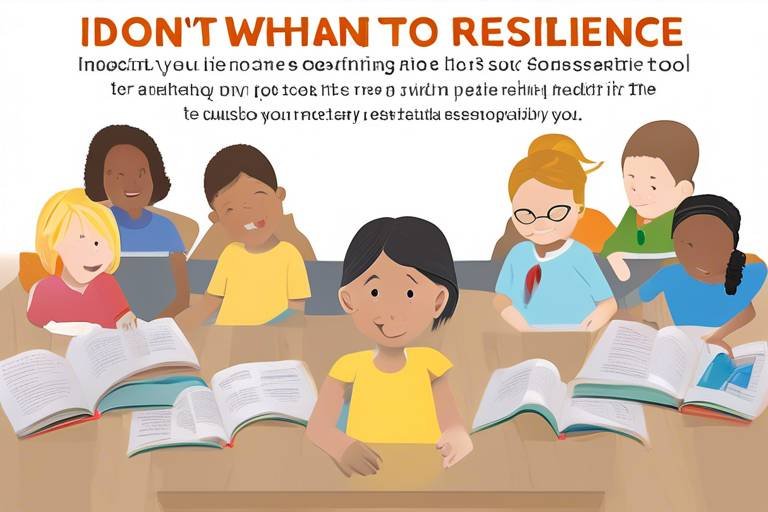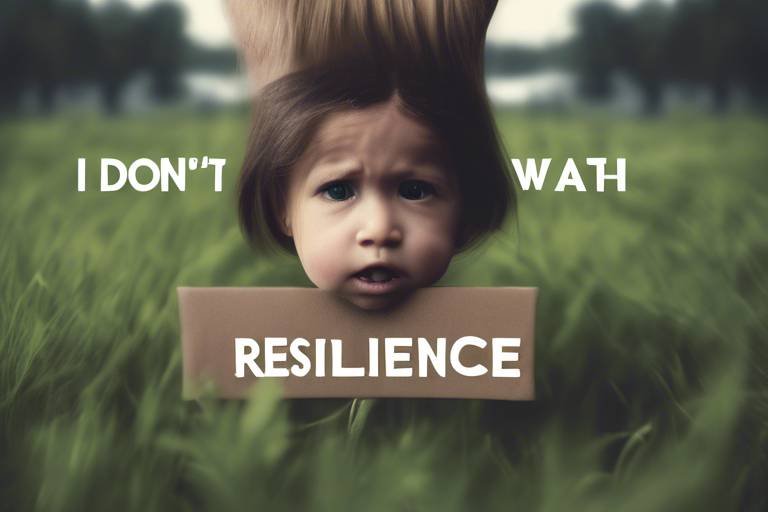How Resilience Can Help Overcome Life's Biggest Disappointments?
Life is a rollercoaster, isn't it? One moment you’re on top of the world, and the next, you’re facing a gut-wrenching disappointment. Whether it’s losing a job, ending a relationship, or facing health challenges, these moments can feel like a punch to the gut. But here’s the good news: resilience is your secret weapon in navigating these turbulent times. It’s not just about bouncing back; it’s about learning, growing, and coming back stronger than ever.
So, what exactly is resilience? Think of it as your mental and emotional elasticity. Just like a rubber band that stretches but doesn’t break, resilient individuals can stretch their limits and adapt to challenges without losing their core strength. Resilience is vital because it allows you to face life’s disappointments head-on, transforming potential setbacks into stepping stones for future success.
Imagine you’re climbing a mountain, and suddenly a rockslide occurs. You could either give up and retreat or find a new path to the summit. Resilience is the mindset that helps you choose the latter. It’s about having the courage to pick yourself up, dust yourself off, and continue your journey, no matter how steep the climb becomes. This article will explore the concept of resilience, the science behind it, and practical strategies to cultivate it in your life.
In the following sections, we will delve into the psychological and biological factors that contribute to resilience. We’ll also explore how emotional intelligence plays a crucial role in enhancing your ability to cope with disappointments. By understanding and managing your emotions, you can build a stronger foundation for resilience. And let’s not forget the importance of mindfulness practices, which can significantly bolster your resilience, helping you stay grounded in challenging times.
So, are you ready to embark on this journey towards resilience? Together, we’ll uncover the tools and techniques that can help you not only survive but thrive in the face of adversity. Remember, every disappointment carries the seeds of growth, and with resilience, you can cultivate a flourishing life, even amidst the toughest storms.
- What is resilience? Resilience is the ability to bounce back from adversity, adapting positively to challenges and setbacks.
- Why is resilience important? Resilience helps individuals cope with disappointments and recover from difficult situations, leading to personal growth and emotional well-being.
- How can I build resilience? You can build resilience through mindfulness practices, developing emotional intelligence, and fostering social connections.
- Can resilience be learned? Yes, resilience can be cultivated through practice and by adopting positive thinking patterns and coping strategies.

Understanding Resilience
Resilience is more than just a buzzword; it’s a vital quality that enables us to navigate life’s rocky terrain. It’s the ability to bounce back from adversity, to spring back like a rubber band after being stretched to its limits. Imagine life as a roller coaster—full of ups and downs, twists and turns. Resilience is what keeps you from flying off the track during the dips. It’s the inner strength that helps you cope with stress, overcome challenges, and emerge stronger than before.
So, why is resilience so important? Well, life is unpredictable. We all face disappointments, whether it’s a job loss, a breakup, or a setback in our personal goals. These experiences can feel overwhelming, but resilience helps us to not just survive these moments but to thrive in spite of them. It’s like having an emotional toolkit that equips you with the skills to handle whatever life throws your way.
Resilience manifests in various forms in our everyday lives. For instance, when faced with a difficult situation, resilient individuals often exhibit a few key traits:
- Adaptability: They adjust their strategies and approach based on the situation at hand.
- Optimism: They maintain a positive outlook, believing in their ability to overcome challenges.
- Persistence: They keep pushing forward, even when the going gets tough.
Understanding the essence of resilience is crucial for anyone looking to enhance their ability to cope with disappointments. It’s not about avoiding stress or hardship; rather, it’s about developing the capacity to face these challenges head-on. By fostering resilience, you’re essentially building a mental muscle that can be strengthened over time.
In summary, resilience is a dynamic, multifaceted quality that plays a pivotal role in how we respond to life’s challenges. It’s about bouncing back, adapting, and finding strength in adversity. By embracing resilience, we can transform our disappointments into opportunities for growth and learning, ultimately leading to a more fulfilling life.

The Science of Resilience
Resilience is not just a buzzword; it’s a fascinating interplay of psychological and biological factors that help individuals navigate through life’s ups and downs. Imagine resilience as a rubber band—it stretches, it bends, but it always snaps back into shape. This remarkable ability to recover from setbacks is rooted in various elements, including genetics, environment, and personal experiences. Research has shown that some people are naturally more resilient due to their genetic makeup, while others develop resilience through life experiences and learned coping strategies.
Studies in psychology reveal that resilience can be cultivated and strengthened over time. For instance, a study conducted by the American Psychological Association found that individuals who face adversity often develop a set of skills and traits that enhance their ability to deal with future challenges. These traits can include optimism, emotional regulation, and a sense of purpose. It's like building a muscle; the more you exercise it, the stronger it becomes.
Interestingly, resilience is not just about bouncing back; it’s also about growth. When faced with disappointments, resilient individuals often find ways to learn from their experiences, turning setbacks into opportunities for personal development. This concept is supported by research from Dr. Martin Seligman, a pioneer in positive psychology, who emphasizes the importance of a growth mindset. Instead of viewing failures as dead ends, resilient people see them as stepping stones toward greater achievements.
Moreover, the biological aspect of resilience cannot be overlooked. Neuroplasticity, the brain's ability to reorganize itself by forming new neural connections, plays a crucial role in how we respond to stress and adversity. When we face challenges, our brains adapt, allowing us to develop new ways of thinking and behaving. This adaptability is a key component of resilience, enabling us to recover from disappointments more effectively.
To sum it up, the science of resilience is a rich tapestry woven from psychological insights and biological mechanisms. Understanding these aspects can empower individuals to foster their resilience, equipping them with the tools to face life’s inevitable challenges. As we delve deeper into the nuances of resilience, we can uncover strategies to enhance our ability to cope with disappointments and emerge stronger than before.
- What is resilience? Resilience is the ability to bounce back from adversity and adapt to challenging situations.
- Can resilience be learned? Yes, resilience can be developed through various strategies and experiences.
- What role does emotional intelligence play in resilience? Emotional intelligence helps individuals understand and manage their emotions, which enhances their ability to cope with setbacks.
- How can I build resilience? Building resilience can involve practices like mindfulness, seeking social support, and reframing negative thoughts.

Emotional Intelligence and Resilience
When we talk about resilience, it's impossible to ignore the incredible role that emotional intelligence plays in shaping our ability to bounce back from life's disappointments. Think of emotional intelligence as the fuel that powers your resilience engine. It’s not just about feeling your emotions but truly understanding and managing them effectively. Imagine trying to sail through a stormy sea without a compass; that’s how it feels to navigate life’s challenges without emotional intelligence. By enhancing our emotional awareness, we can steer our ships more confidently through turbulent waters.
Research shows that individuals with high emotional intelligence tend to cope better with setbacks. They possess a keen ability to recognize their emotional triggers and respond rather than react impulsively. This skill is paramount when facing disappointments, as it allows for a more measured approach to problem-solving. When faced with adversity, those who can pause, reflect, and understand their emotional responses are often the ones who emerge stronger. They transform setbacks into learning opportunities rather than viewing them as insurmountable obstacles.
So, what exactly does emotional intelligence entail? It encompasses several key components:
- Self-awareness: Knowing your emotions and how they affect your thoughts and behavior.
- Self-regulation: The ability to manage your emotions in healthy ways, especially during tough times.
- Motivation: Harnessing your emotions to pursue goals with energy and persistence.
- Empathy: Understanding the emotions of others, which can strengthen your connections and support systems.
- Social skills: Building and maintaining healthy relationships that can provide support during disappointments.
By cultivating these components, we not only enhance our own resilience but also create a ripple effect that encourages those around us to be more resilient too. It’s like planting seeds of strength in our communities, where everyone can grow together. The more we understand our own emotions, the better we can empathize with others, creating a supportive network that helps everyone navigate their challenges.
Incorporating emotional intelligence into our daily lives doesn’t have to be daunting. Simple practices, such as reflecting on your emotional responses or engaging in active listening with others, can significantly enhance your emotional skills. Over time, these practices can help you build a robust framework for resilience, enabling you to tackle disappointments with a renewed perspective and vigor.
As we journey through life, remember that resilience is not a static trait but a dynamic process. By nurturing our emotional intelligence, we can continuously adapt and grow, transforming life’s inevitable disappointments into stepping stones toward greater strength and wisdom.

Developing Emotional Awareness
Emotional awareness is like having a compass in the stormy seas of life. It helps you navigate through turbulent feelings and understand the deeper currents that influence your reactions. When you develop emotional awareness, you become more attuned to your feelings, which is essential for building resilience. Imagine trying to drive a car without knowing how fast you’re going or where you’re headed; that’s what it feels like to go through life without emotional awareness. You might find yourself reacting impulsively, feeling overwhelmed, or struggling to cope with disappointments.
To cultivate emotional awareness, start by paying attention to your feelings. This can be as simple as taking a moment to check in with yourself throughout the day. Ask yourself questions like: What am I feeling right now? or Why am I feeling this way? By consistently engaging in this practice, you can develop a clearer understanding of your emotional landscape. You might even consider keeping a journal where you jot down your feelings and thoughts. This not only helps in recognizing patterns but also provides a safe space to express your emotions.
Another effective technique is to practice mindfulness. Mindfulness encourages you to be present in the moment and observe your thoughts and feelings without judgment. This can be particularly helpful during tough times when emotions run high. For instance, when you find yourself feeling anxious or disappointed, take a few deep breaths and focus on the sensations in your body. Notice how your heart races or how tension builds in your shoulders. Acknowledging these physical responses can help you understand your emotional state better.
Moreover, engaging in conversations with trusted friends or family members can enhance your emotional awareness. Sharing your feelings with others not only fosters connections but also provides new perspectives on your experiences. You might discover that others have faced similar disappointments and have valuable insights to share. This exchange can be incredibly enlightening and can help you feel less isolated in your struggles.
In summary, developing emotional awareness is a vital step in building resilience. By tuning into your feelings, practicing mindfulness, and engaging with others, you can create a strong foundation for navigating life’s disappointments. Remember, it’s not about avoiding negative emotions; it’s about understanding them and using that understanding to bounce back stronger than before.
- What is emotional awareness? Emotional awareness is the ability to recognize and understand your emotions and their impact on your behavior and thoughts.
- How can I improve my emotional awareness? You can improve your emotional awareness through mindfulness practices, journaling, and open conversations with trusted individuals.
- Why is emotional awareness important for resilience? Emotional awareness helps you understand and manage your feelings effectively, enabling you to cope better with disappointments and challenges.

Building Empathy
Empathy is like a bridge connecting us to others. It's that magical ability to step into someone else's shoes, to feel their pain, joy, and everything in between. When we cultivate empathy, we not only enhance our relationships but also boost our resilience. Why? Because understanding and sharing the feelings of others creates a support network that can help us navigate our own disappointments.
Imagine you're going through a tough time, perhaps a job loss or a breakup. It’s easy to feel isolated, as if the world is closing in around you. But when you have empathetic friends or family members who genuinely understand what you're feeling, it can make all the difference. They can provide comfort, share their own experiences, and remind you that you’re not alone in your struggles. This sense of connection is vital; it acts as a safety net that can catch you when you fall.
Building empathy isn't just about feeling sorry for someone; it’s about truly understanding their experiences and emotions. Here are some practical steps to enhance your empathetic skills:
- Active Listening: Pay attention to what others are saying without planning your response while they speak. This shows you value their feelings and perspectives.
- Ask Questions: Engage with others by asking open-ended questions about their feelings and experiences. This not only shows your interest but also encourages deeper conversations.
- Share Your Own Experiences: Sometimes, sharing a similar experience can help others feel understood and validated. It creates a two-way street of empathy.
As we build our empathy, we also learn to cope better with our disappointments. When we recognize that everyone faces challenges, it can shift our perspective. Instead of feeling like a victim of our circumstances, we can see ourselves as part of a larger human experience. This understanding can be incredibly liberating.
In essence, building empathy is not just a tool for supporting others; it’s a powerful strategy for enhancing our own resilience. It allows us to connect, share, and heal together. So, the next time you face a disappointment, remember that reaching out and fostering empathy can help you bounce back stronger than ever.
1. What is empathy?
Empathy is the ability to understand and share the feelings of another person. It involves recognizing their emotions and responding in a compassionate way.
2. How can empathy help in building resilience?
Empathy fosters connections with others, creating a support system that can help individuals cope with their disappointments and challenges more effectively.
3. Are there specific techniques to improve empathy?
Yes! Techniques like active listening, asking open-ended questions, and sharing personal experiences can significantly enhance one’s empathetic skills.
4. Can empathy be learned?
Absolutely! While some people may naturally be more empathetic, it is a skill that can be developed through practice and conscious effort.

Strategies for Building Resilience
Building resilience is like constructing a sturdy fortress around your emotional well-being. It’s not just about bouncing back; it’s about bouncing forward, transforming setbacks into stepping stones. To cultivate this vital trait, you need a toolkit of strategies that can help you navigate life's inevitable ups and downs. Here are some effective approaches to consider:
1. Embrace Mindfulness: Mindfulness is more than just a buzzword; it’s a powerful practice that helps you stay anchored in the present moment. By focusing on what’s happening right now, you can reduce anxiety and stress. This practice allows you to observe your thoughts and feelings without judgment, which can be incredibly liberating. You might even find that taking a few moments to breathe deeply and center yourself can make all the difference when facing a tough situation.
2. Build a Support Network: Nobody should have to face disappointments alone. Surrounding yourself with supportive friends and family can provide a cushion during hard times. Having someone to talk to can lighten your emotional load and offer new perspectives. Think of your support network as a safety net; it’s there to catch you when you fall. You can also consider joining community groups or online forums where you can share experiences and gain insights from others who have faced similar challenges.
3. Practice Self-Compassion: It’s easy to be hard on yourself when things don’t go as planned. However, practicing self-compassion can help you treat yourself with kindness during tough times. Instead of criticizing yourself for perceived failures, try talking to yourself as you would to a friend. This shift in perspective can foster resilience by allowing you to acknowledge your feelings without letting them overwhelm you.
4. Set Realistic Goals: When faced with disappointment, it’s crucial to reassess your goals. Setting small, achievable objectives can provide a sense of direction and purpose. This strategy not only helps you stay focused but also allows you to celebrate small victories along the way. Think of these goals as stepping stones that lead you toward your larger aspirations, making the journey feel less daunting.
5. Engage in Physical Activity: Physical health plays a significant role in emotional resilience. Regular exercise releases endorphins, which can improve your mood and overall outlook on life. Whether it’s a brisk walk, yoga, or dancing, find an activity that you enjoy. Not only does it help relieve stress, but it also gives you a sense of accomplishment that can boost your confidence.
6. Cognitive Reframing: This technique involves changing the way you perceive a situation. Instead of viewing a setback as a failure, consider it an opportunity for growth. Ask yourself, “What can I learn from this experience?” By shifting your mindset, you can transform negative thoughts into constructive ones, which can significantly enhance your resilience.
Incorporating these strategies into your daily routine can help you build a more resilient mindset. Remember, resilience isn’t a trait you either have or don’t have; it’s a skill that can be developed over time. The more you practice these strategies, the stronger your emotional fortress will become, allowing you to face life’s disappointments with grace and strength.
- What is resilience? Resilience is the ability to recover from setbacks, adapt well to change, and keep going in the face of adversity.
- Can resilience be learned? Yes, resilience can be developed through various strategies, including mindfulness, building support networks, and practicing self-compassion.
- How does mindfulness help with resilience? Mindfulness helps individuals stay present, reduces anxiety, and allows for better emotional regulation, all of which contribute to greater resilience.
- What role does physical activity play in building resilience? Physical activity promotes emotional well-being, reduces stress, and enhances mood, which are all critical components of resilience.

The Role of Mindfulness
Mindfulness is more than just a trendy buzzword; it’s a powerful practice that can significantly enhance resilience in the face of life's challenges. Imagine standing in the middle of a storm, feeling the wind whip around you, yet somehow remaining calm and centered. That’s what mindfulness can do for your mental state. By focusing on the present moment, individuals can cultivate a sense of awareness that helps them manage stress and recover from setbacks more effectively. When we practice mindfulness, we train our minds to observe our thoughts and feelings without judgment. This practice allows us to recognize when we’re feeling overwhelmed by disappointment, enabling us to respond rather than react impulsively.
Research shows that mindfulness can physically alter our brain's structure, enhancing areas responsible for emotional regulation and resilience. For instance, studies have found that regular mindfulness practice can increase the density of gray matter in the prefrontal cortex, the area of the brain that governs decision-making and emotional control. This means that by simply being present, we can literally change how our brains function, making it easier to bounce back from life's hurdles.
But how do we incorporate mindfulness into our daily lives? It doesn’t have to be complicated or time-consuming. Here are some simple mindfulness practices that you can start with:
- Mindful Breathing: Take a few moments each day to focus solely on your breath. Inhale deeply through your nose, hold for a few seconds, and then exhale slowly through your mouth. This simple act can ground you and bring clarity to your thoughts.
- Body Scan Meditation: Lie down comfortably and mentally scan your body from head to toe. Notice any tension or discomfort and consciously relax those areas. This practice helps to connect your mind with your body, fostering a sense of calm.
- Gratitude Journaling: Spend a few minutes each day writing down things you’re grateful for. This practice shifts your focus from what’s going wrong in your life to what’s going right, promoting a positive mindset.
Incorporating these techniques into your routine can help you cultivate a resilient mindset. Remember, mindfulness is about progress, not perfection. It’s okay if your mind wanders; the key is to gently bring your focus back to the present moment. Over time, these small practices can lead to significant improvements in how you handle disappointment and adversity.
Ultimately, embracing mindfulness is like adding a sturdy umbrella to your toolkit for navigating life's storms. It equips you with the ability to weather the rain without getting soaked, allowing you to emerge stronger and more resilient on the other side.
Q: What is mindfulness?
A: Mindfulness is the practice of being fully present and engaged in the current moment, without judgment. It involves observing your thoughts and feelings to better understand and manage them.
Q: How can mindfulness improve resilience?
A: Mindfulness helps individuals manage stress and emotional responses, allowing them to cope better with disappointments and setbacks. It promotes emotional regulation and a more positive outlook.
Q: Do I need to meditate for hours to be mindful?
A: No, mindfulness can be practiced in short bursts throughout the day. Simple techniques like mindful breathing or gratitude journaling can be effective even if done for just a few minutes.

Mindful Breathing Techniques
When life throws its curveballs, feeling overwhelmed can be a natural response. But what if I told you that a simple technique like mindful breathing could be your secret weapon against stress? Mindful breathing isn't just about taking a few deep breaths; it's about fully engaging with your breath to anchor yourself in the present moment. This practice helps clear the mental clutter and brings you back to a state of calm. Imagine your mind as a snow globe; when you shake it, everything inside swirls chaotically. Mindful breathing is like setting that globe down and watching the snow settle peacefully.
To get started with mindful breathing, find a quiet space where you can sit comfortably. Close your eyes, if that feels right, and take a moment to notice your natural breathing rhythm. You might feel your chest rise and fall or the air flowing in and out of your nostrils. Awareness is key here. As thoughts start to creep in—because they will—acknowledge them without judgment and gently guide your focus back to your breath. This is the essence of mindfulness: being present without getting caught up in the whirlwind of your thoughts.
Now, let’s dive deeper into some specific techniques that can enhance your mindful breathing practice:
- 4-7-8 Breathing: Inhale through your nose for a count of 4, hold your breath for a count of 7, and exhale slowly through your mouth for a count of 8. This technique is excellent for calming the nervous system.
- Box Breathing: Inhale for a count of 4, hold for 4, exhale for 4, and hold again for 4. Picture a box in your mind as you go through each step, and feel the grounding effect it has.
- Deep Belly Breathing: Place one hand on your chest and the other on your belly. Inhale deeply through your nose, allowing your belly to rise while keeping your chest relatively still. Exhale slowly through your mouth, feeling your belly fall. This technique promotes relaxation and reduces anxiety.
Each of these techniques can be practiced anywhere, anytime, making them incredibly accessible tools to incorporate into your daily routine. Whether you're facing a stressful meeting, dealing with personal disappointments, or just need a moment of peace, mindful breathing can help you regain your composure and clarity. Think of it as a mental reset button, allowing you to approach challenges with a fresh perspective.
As you practice these techniques, remember that consistency is key. Start with just a few minutes each day and gradually increase the duration as you become more comfortable. Over time, you’ll likely notice that not only do you feel calmer, but you also develop a greater sense of resilience when faced with life’s inevitable disappointments.
Incorporating mindful breathing into your life can be a transformative experience. It’s like planting seeds of calm in the garden of your mind; with regular care and attention, they will blossom into a resilient mindset, ready to face whatever challenges come your way.
Q: How long should I practice mindful breathing?
A: Start with just 5 minutes a day and gradually increase the time as you become more comfortable with the practice.
Q: Can I practice mindful breathing anywhere?
A: Absolutely! Mindful breathing can be practiced in any setting—at home, in the office, or even while commuting.
Q: What if my mind keeps wandering during practice?
A: That's perfectly normal! Acknowledge the thoughts and gently bring your focus back to your breath without judgment.
Q: Are there any specific times that are better for practicing mindful breathing?
A: Morning and evening are great times to practice, but you can also use it during stressful moments throughout the day.

Creating a Resilient Mindset
Creating a resilient mindset is like building a fortress around your emotional well-being. It’s about embracing challenges as stepping stones rather than stumbling blocks. When life throws curveballs, having a resilient mindset allows you to adapt and thrive. But how exactly do you cultivate this mindset? It starts with positive thinking and a willingness to view setbacks as opportunities for growth.
One effective way to foster this mindset is by practicing cognitive reframing. This technique involves changing the way you perceive a situation. Instead of seeing a failure as a dead end, try to view it as a learning experience. For instance, if you didn’t get that job you were hoping for, rather than dwelling on the disappointment, consider what skills you can improve or what new opportunities might arise. This shift in perspective can be a game changer.
Moreover, it's essential to acknowledge that resilience isn't about ignoring your feelings; it's about understanding and processing them. When you face disappointment, allow yourself to feel the emotions that come with it. This emotional honesty can lead to greater self-awareness and ultimately strengthen your resilience. Remember, even the strongest trees bend in the wind; it’s how they bounce back that matters.
Another critical aspect of developing a resilient mindset is surrounding yourself with a robust support system. Think of your friends and family as your emotional safety net. When times get tough, having someone to lean on can make all the difference. It’s like having a team of cheerleaders who remind you that you’re not alone in your struggles. So, reach out, share your feelings, and lean on those who uplift you.
Incorporating mindfulness practices into your daily routine can also significantly enhance your resilience. Mindfulness teaches you to stay present, helping you manage stress and anxiety effectively. When you’re grounded in the moment, it becomes easier to navigate through difficulties without being overwhelmed. Simple techniques like mindful breathing can help you regain composure during stressful times.
Lastly, challenge yourself to embrace a growth mindset. This means believing that your abilities and intelligence can be developed with effort and persistence. When you adopt this mindset, failures transform into lessons, and obstacles become challenges to overcome. It’s akin to viewing life as a series of puzzles to solve rather than a series of tests to pass. This perspective not only fosters resilience but also ignites a passion for lifelong learning.
In summary, creating a resilient mindset is about more than just positive thinking; it involves emotional awareness, support systems, mindfulness, and a commitment to personal growth. By embracing these strategies, you can build a mental fortress that not only withstands life's disappointments but also thrives in the face of adversity.
- What is resilience? Resilience is the ability to bounce back from adversity, adapting well in the face of challenges and stress.
- Can resilience be learned? Yes, resilience can be developed through various strategies such as mindfulness, cognitive reframing, and building supportive relationships.
- How does emotional intelligence relate to resilience? Emotional intelligence helps individuals manage their emotions effectively, which in turn enhances their ability to cope with disappointments and setbacks.
- What are some practical ways to build resilience? Practical ways include practicing mindfulness, seeking social support, and adopting a growth mindset.
Frequently Asked Questions
- What is resilience?
Resilience is the ability to bounce back from setbacks, adapt to challenging situations, and keep moving forward despite difficulties. It's like a rubber band; the more you stretch it, the more it can return to its original shape. Resilience helps individuals cope with disappointments and emerge stronger.
- Why is resilience important?
Resilience is crucial because it equips individuals with the tools to handle stress and adversity. It enables us to navigate through life's ups and downs with a positive outlook, reducing the impact of disappointments on our mental health. Think of it as your personal shield against life's storms!
- How can I develop resilience?
Developing resilience is a journey that involves several strategies. You can start by practicing mindfulness, building emotional awareness, and seeking social support. Engaging in activities that promote positive thinking and empathy can also strengthen your resilience over time.
- What role does emotional intelligence play in resilience?
Emotional intelligence is key to resilience because it helps you understand and manage your emotions effectively. When you can recognize your feelings and those of others, you’re better equipped to respond to disappointments in a constructive way. It's like having a roadmap for navigating your emotional landscape!
- Can mindfulness really help with resilience?
Absolutely! Mindfulness practices, such as mindful breathing and meditation, can significantly enhance your resilience. By being present and aware, you can manage stress better and recover from setbacks more effectively, allowing you to approach challenges with a calm and clear mind.
- What are some practical strategies for building resilience?
Some effective strategies include practicing mindfulness, seeking social support, and cognitive reframing. Engaging in regular physical activity, maintaining a balanced lifestyle, and focusing on positive relationships can also bolster your resilience and help you face life's challenges with confidence.
- How does empathy contribute to resilience?
Empathy plays a significant role in resilience by fostering connections with others. When you can empathize with others, it strengthens your support network and helps you cope with your own disappointments. It's like having a team of cheerleaders ready to lift you up when times get tough!


















